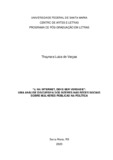| dc.creator | Vargas, Thaynara Luiza de | |
| dc.date.accessioned | 2021-11-16T19:19:44Z | |
| dc.date.available | 2021-11-16T19:19:44Z | |
| dc.date.issued | 2020-03-16 | |
| dc.identifier.uri | http://repositorio.ufsm.br/handle/1/22821 | |
| dc.description.abstract | Our theoretical apparatus to develop the work “I read on the internet, it must be true”:
a discursive analysis of the sayings about political women on social medias is based
on the Discourse Analysis of French line, structured by Michel Pêcheux in France and
developed in Brazil by Eni Orlandi, and from this theoretical perspective, we seek to
analyze how discourse about women is constituted in false news that spread on the
internet as being truths. Our main objective is to analyze clippings of discursive
materialities found on social medias, especially on Facebook, which contain comments
and opinions about women from false news, the so-called fake news, in order to try to
explain which meanings produce the sayings about the political woman in the 21st
century. For this, we selected cases of greater national repercussion, such as the death
of city councilor Marielle Franco, in Rio de Janeiro, which caused several fake news
stories that incited hatred against the victim, as well as several fake news about
Manuela D'ávila, which spread on the internet during her candidacy for the country's
vice presidency. As for the methodology, at first, we mapped publications that
contained discourse about women - giving priority to cases of great repercussion -, so
that we could then constitute the corpus of our work. Subsequently, we analized our
research object, in order to identify whether the meanings that are currently at stake
about women break or not with statements that the male chauvinism has stabilized in
common sense and memory. At the end of this research, we explain how the
statements about the political woman produce meanings that are still so male
chauvinists in the 21st century, even with feminist struggles and all the conquests
already achieved with them. In presenting the results, we seek to reflect on how the
false news about political women are working behind ideologies that overlap men at
the expense of women, devaluing them and reflect meanings that take women
(political) as the object of sayings arising from male chauvinism discursive formations. | eng |
| dc.description.sponsorship | Coordenação de Aperfeiçoamento de Pessoal de Nível Superior - CAPES | por |
| dc.language | por | por |
| dc.publisher | Universidade Federal de Santa Maria | por |
| dc.rights | Attribution-NonCommercial-NoDerivatives 4.0 International | * |
| dc.rights.uri | http://creativecommons.org/licenses/by-nc-nd/4.0/ | * |
| dc.subject | Discurso | por |
| dc.subject | Mulher | por |
| dc.subject | Redes sociais | por |
| dc.subject | Notícias falsas | por |
| dc.subject | Política | por |
| dc.subject | Discourse | eng |
| dc.subject | Women | eng |
| dc.subject | Social medias | eng |
| dc.subject | Fake news | eng |
| dc.subject | Politics | eng |
| dc.title | “Li na internet, deve ser verdade”: uma análise discursiva dos dizeres sobre mulheres políticas nas redes sociais | por |
| dc.title.alternative | “I read on the internet, it must be true”: a discursive analysis of the sayings about political women on social medias | eng |
| dc.type | Dissertação | por |
| dc.description.resumo | O nosso aparato teórico para desenvolver o trabalho “Li na internet, deve ser verdade”:
uma análise discursiva dos dizeres sobre a mulher nas redes sociais baseia-se na
Análise de Discurso de linha francesa, estruturada por Michel Pêcheux na França e
desenvolvida no Brasil por Eni Orlandi, sendo que, a partir dessa perspectiva teórica,
buscamos analisar como se constitui o discurso sobre a mulher em notícias falsas que
se espalham na internet como sendo verdades. Nosso principal objetivo consiste em
analisarmos recortes de materialidades discursivas encontradas nas redes sociais,
em especial no Facebook, que contenham comentários e opiniões sobre mulheres
políticas a partir de notícias falsas, as chamadas fake news, para buscarmos explicitar
quais sentidos produzem os dizeres sobre a mulher política no século XXI. Para isso,
selecionamos casos de maior repercussão nacional, como a morte da vereadora
Marielle Franco, no Rio de Janeiro, que causou diversas fake news que incitavam o
ódio contra a vítima, bem como as várias notícias falsas sobre Manuela D’ávila, que
se espalharam na internet durante sua candidatura à vice-presidência do país. Quanto
à metodologia, em um primeiro momento, fizemos um mapeamento de publicações
que continham dizeres sobre mulheres políticas – dando prioridade a casos de grande
repercussão –, para então constituirmos o corpus de nosso trabalho. Posteriormente,
fizemos a análise de nosso objeto de pesquisa, a fim de identificar se os sentidos que
estão em jogo atualmente sobre a mulher rompem ou não com enunciados que a
cultura machista estabilizou no senso comum e na memória. Ao final desta pesquisa,
explicitamos como os dizeres sobre a mulher política produzem sentidos ainda tão
machistas em pleno século XXI, mesmo com as lutas feministas e todas as conquistas
já conquistadas com elas. Ao apresentarmos os resultados, buscamos refletir sobre
como as notícias falsas sobre as mulheres políticas estão funcionando por trás de
ideologias que sobrepõem o homem em detrimento da mulher, desvalorizando-a e
refletem sentidos que tomam a mulher (política) como objeto de dizeres advindos de
formações discursivas machistas. | por |
| dc.contributor.advisor1 | Martins, Taís da Silva | |
| dc.contributor.advisor1Lattes | http://lattes.cnpq.br/8223110305050343 | por |
| dc.contributor.referee1 | Scherer, Amanda Eloina | |
| dc.contributor.referee2 | Garcia, Dantielli Assumpção | |
| dc.creator.Lattes | http://lattes.cnpq.br/8603146118598347 | por |
| dc.publisher.country | Brasil | por |
| dc.publisher.department | Letras | por |
| dc.publisher.initials | UFSM | por |
| dc.publisher.program | Programa de Pós-Graduação em Letras | por |
| dc.subject.cnpq | CNPQ::LINGUISTICA, LETRAS E ARTES::LETRAS | por |
| dc.publisher.unidade | Centro de Artes e Letras | por |



